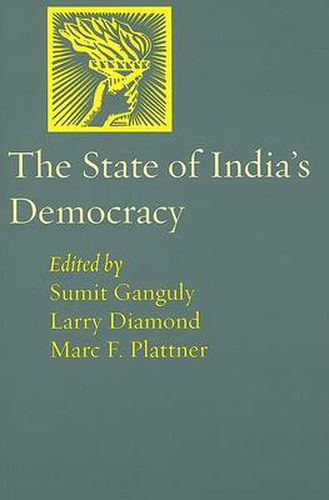Readings Newsletter
Become a Readings Member to make your shopping experience even easier.
Sign in or sign up for free!
You’re not far away from qualifying for FREE standard shipping within Australia
You’ve qualified for FREE standard shipping within Australia
The cart is loading…






The newest volume in the acclaimed Journal of Democracy series examines the state of India’s democracy. As India marks its sixtieth year of independence, it has become an ever more important object of study for scholars of comparative democracy. It has long stood out as a remarkable exception to theories holding that low levels of economic development and high levels of social diversity pose formidable obstacles to the successful establishment and maintenance of democratic government. In recent decades, India has proven itself capable not only of preserving democracy, but of deepening and broadening it by moving to a more inclusive brand of politics. Political participation has widened, electoral alternation has intensified, and civil society has pressed more vigorously for institutional reforms and greater government accountability. Yet political scientists still have not devoted to this country, which contains more than one-sixth of the world’s population, the kind of attention that its significance warrants. The essays in The State of India’s Democracy focus on India’s economy, society, and politics, providing illuminating insights into the past accomplishments of Indian democracy as well as the continuing challenges that it faces.
$9.00 standard shipping within Australia
FREE standard shipping within Australia for orders over $100.00
Express & International shipping calculated at checkout
The newest volume in the acclaimed Journal of Democracy series examines the state of India’s democracy. As India marks its sixtieth year of independence, it has become an ever more important object of study for scholars of comparative democracy. It has long stood out as a remarkable exception to theories holding that low levels of economic development and high levels of social diversity pose formidable obstacles to the successful establishment and maintenance of democratic government. In recent decades, India has proven itself capable not only of preserving democracy, but of deepening and broadening it by moving to a more inclusive brand of politics. Political participation has widened, electoral alternation has intensified, and civil society has pressed more vigorously for institutional reforms and greater government accountability. Yet political scientists still have not devoted to this country, which contains more than one-sixth of the world’s population, the kind of attention that its significance warrants. The essays in The State of India’s Democracy focus on India’s economy, society, and politics, providing illuminating insights into the past accomplishments of Indian democracy as well as the continuing challenges that it faces.